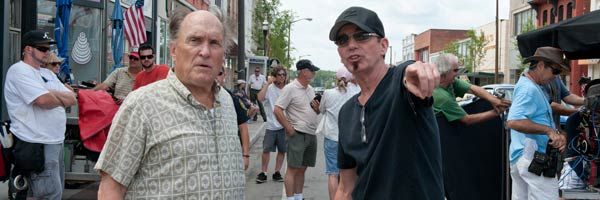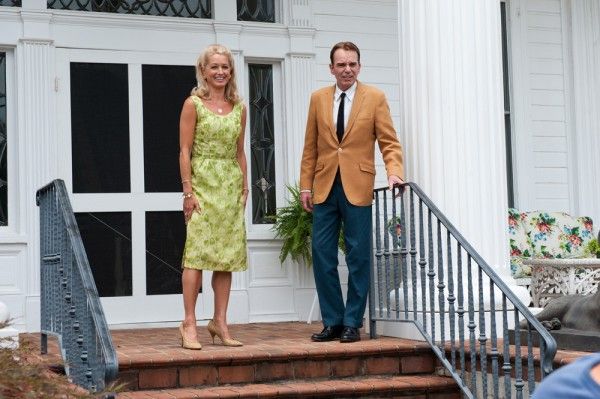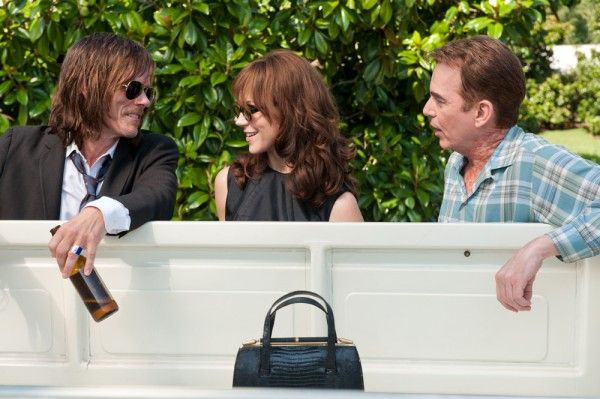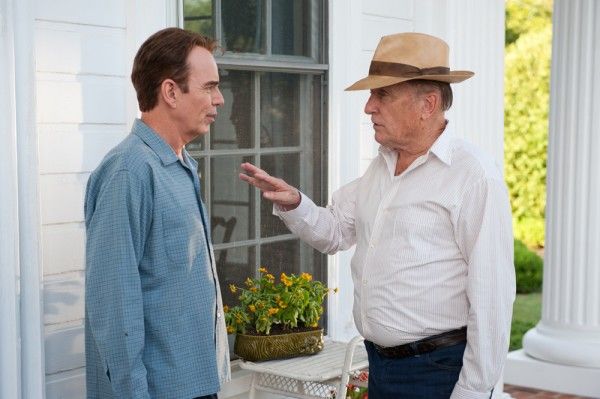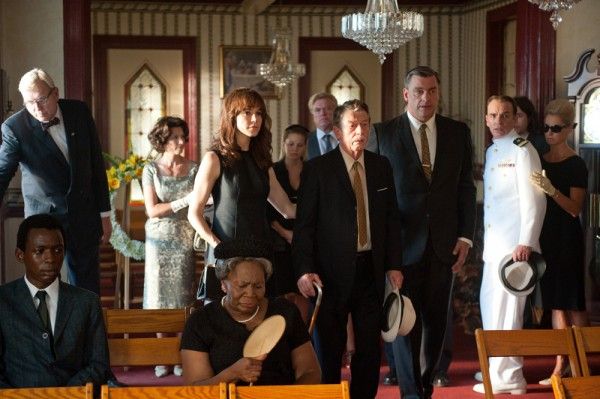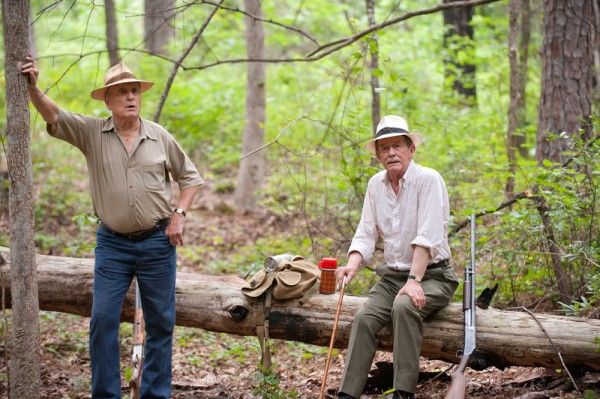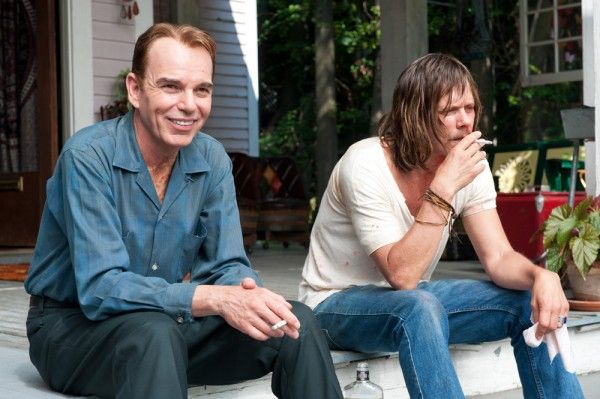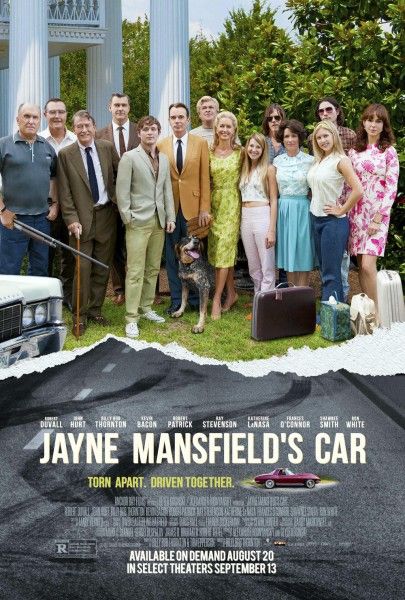The big blockbuster and superhero movies can be a lot of fun, but sometimes quiet character films can be just as magical. And when the talent of actor/filmmaker Billy Bob Thornton is involved, that movie is sure to be equal parts compelling and quirky. Jayne Mansfield’s Car is set in 1969 in a small Alabama town, when the death of an eccentric family’s long-estranged wife and mother brings together two very different families for the funeral, forcing their differences to light and exposing truths that could lead to the most unexpected outcomes. The cast includes Robert Duvall, John Hurt, Kevin Bacon, Robert Patrick, Ray Stevenson, Katherine LaNasa and Frances O’Connor.
During this recent exclusive phone interview with Collider, actor/writer/director Billy Bob Thornton talked about why it’s taken him so many years to direct again, why he chose to do this script with a writing partner, how Jayne Mansfield’s car became a part of the story, how challenging the editing process is, having to cut Tippi Hedren out of the movie for time, and how he’ll probably include one of her scenes on the DVD. He also talked about his desire to someday put his director’s cut of All the Pretty Horses on DVD, how everyone involved still wants to make Bad Santa 2 happen, what drew him to the FX mini-series Fargo, which Joel and Ethan Coen are executive producers on, and how he’ll probably wait at least a couple of years before he directs again. Check out what he had to say after the jump.
Collider: This is quite a character piece with such an interesting group of characters in it.
BILLY BOB THORNTON: Well, thank you. That’s my bag. I love characters and their odd situations because I grew up around a lot of characters and in very many odd situations. So, it’s always nice to be able to get ‘em out there in a film.
It’s been quite some time since audiences have gotten to see anything you’ve written and directed. Was that just because you were too focused on your acting and music, or were you always writing and filing things away that you wanted to direct, at some point?
THORNTON: You know, I’ve always got a few ideas rolling around in my head. I’m sure you’ve been hanging around your house before thinking, “One of these days, I’m gonna paint that damn bedroom,” or whatever it is. So, I’ve got a few things that have been very important to me, and I’ve had them in my head for years, and ultimately, they’ll come out. But, directing takes a good chunk of your life out. It’s a very hard thing. As an actor, you go in for a couple of months and do your job, and then you move onto another one. As a director, it’s with you for quite some time and you’re responsible for the entire thing, whether the results are good or bad, or whether people throw darts at you or put you on a pedestal. It’s a big responsibility to take on. I think I’m only good at doing things I know very well. I don’t direct movies because I get offered the new vampire movie or science fiction movie. I don’t get offered those, anyway, but if I did, I would just tell ‘em, “Look, I’m the wrong guy.” I only do things about people and situations, and I do the ones that I think I’m the best guy for the job on, which is usually something I generate myself.
Your movies are definitely movies that you couldn’t imagine anyone else directing because they seem to really have a personal connection to you.
THORNTON: Well, it is, and it’s funny that you said that. You’re maybe the first person who’s ever put it that way, and that’s exactly what it is. I’ve never understood the questions, but sometimes people would say, “Did you ever think of having anybody else direct Sling Blade?,” and no, I didn’t. I wonder what that means because how would I explain that to somebody else, and why would you? Why have a middle man? It’s a story that I know, inside and out, so I’ll just put the camera right here and we’ll do it, instead of saying, “Well, you see, there’s this guy . . .” There’s no reason for that. If somebody else had written this movie and somebody else were directing it, for the character of Skip, I probably would have been one of a few actors that they would have been considering for the role. It’s the kind of role I get offered.
How was it to act with and direct Robert Duvall?
THORNTON: Duvall and I were the two characters that I had. I was gonna do a movie where Duvall was gonna play my father, and I had this idea for what I wanted this movie to be about, which was about two or three different things put together. The reason that stuff comes out of our mouths so easily is because it was written for us. So, I was very interested in making this movie. It had been in my head for awhile. For years, I was just doing one movie after the other, as an actor. You get doing that, and you’re doing things that you like, most of the time. And then, every now and then, you’re doing one where you’ve gotta take care of your family, so you’ve gotta make some money and maybe this one you didn’t like as much. You get into doing that, and then when do you decide, “I’m gonna sit down now and write this thing and then go direct it, and I know it’s going to take up all of my time for a couple of years”? You just have to be in the right frame of mind, really, to do it.
Because this story is so personal to you, what was it like to have a writing partner, with Tom Epperson?
THORNTON: I’ve known Tom since I was 8 years old and he was 12 years old. The first screenplays I ever wrote were with Tom, but we hadn’t written together in years. We wrote this movie One False Move together, which was the first one we’d written that we had made. And then, we had a movie called A Family Thing with Duvall, and The Gift with Cate Blanchett made. So, we’d had some movies made, over the years, but we hadn’t done it in a long time. I had written Sling Blade by myself, and I had written Daddy and Them by myself. When I was doing this one, I already had the idea, but I thought, “You know what? This would be good to have Tom to come in on, especially for the English people.” I thought that was something Tom would have fun with. He and I had been discussing writing together again, so when I had this idea, he said, “Yeah, I’d love to!” So, we got the old team together, and got the hats and canes out of the closet.
When so much time passing before you get back in the director’s chair again, do you feel extra pressure, or does it feel like you’ve never skipped a beat?
THORNTON: I would have been nervous, if I was directing Star Trek, or something like that. I would have been nervous at any point, doing something like that, ‘cause I don’t know how to visual effects and storyboards, and all that stuff. But when you make the movies that I do, it just feels really good. I was with a lot of friends. I’ve known John Hurt for over 20 years, and Duvall has been a friend and mentor to me. And I’ve known Kevin Bacon and Robert Patrick, over the years. I had directed Robert before, in All the Pretty Horses. And Ron White is a good friend. So, I was around some people that I knew and I was in an area that I knew well, and was telling a story that was semi-autobiographical with some imagination and observations.
Where did the storyline with Jayne Mansfield’s actual car come from?
THORNTON: I actually did see Jayne Mansfield’s car. They brought it to our town. I grew up in a small town, so they would bring a sideshow item around, every now and then, like Bonnie and Clyde’s car, shot full of bullet holes, and that kind of stuff. When you grew up where I did, if something new is in town, what have you got to do other than go out there and see it? I’ve seen a five-legged cow. One way or the other, I’ve always wanted to put that in a movie. Ultimately, what I wanted to do was make a movie about the romanticism of tragedy, hence the title Jayne Mansfield’s Car, which is a metaphor for the romanticism of tragedy. So, I wanted to make a movie that was not only about the romanticism of tragedy and the lack of communication in families, but also about war and tragedy, and how each generation views it and passes it on to the next generation, and how the psychological damage of that tragedy manifests itself in families. That was the movie I wanted to make, and I wanted to do it in a dramatic and darkly humorous way, and I felt like we accomplished that. Right in the middle of it, you’ve got Jayne Mansfield’s car. My dad took me to car wrecks when I was a little kid. He didn’t know how to express himself or figure things out, so my father stared at horror. He’d been in the Korean War and his ship was hit. He was in the Navy. One of my uncles was in the Battle of the Bulge in WWII, and my grandfather was a medic in WWI, which Duvall is in the movie. I just saw a lot of men who weren’t forthcoming with their feelings, growing up. They didn’t know how to deal with them, so they came out in strange ways.
When you’re telling a story with so many characters who are all so interesting, in their own right, and you have so many great actors in the roles, how challenging is it, in the editing room? Are you good with cutting what needs to be cut, or is that difficult for you to decide?
THORNTON: It is tough. It’s very hard. We didn’t cut out a lot of what’s in there for the people now, but Tippi Hedren played the mother. Originally, we had a bunch of stuff at their home in England, and cut back and forth between the two. When we had to cut it for length, then we had to look at it and say, “Okay, where can we not change this movie?,” and it was all in the beginning. But, you can’t just cut it randomly. There has to be a new way of looking at it. The creative choice was to not see the English people until they get there, just like our people in the movie. We don’t know them. They’re only talked about. We don’t get them until they get there, and that made complete sense. But as a result, I had to lose two very beautiful scenes with Tippi Hedren and John Hurt. As stand-alone scenes, they were beautiful, but they weren’t necessary to the story and we knew that, so those were cut. That was probably the hardest thing. And Ray Stevenson had a very nice monologue that we cut because it ended up being redundant, in some ways. So, there were a few things. It always stings, a little bit, when you’re editing.
Do you like to put deleted scenes on the Blu-ray/DVD release?
THORNTON: I don’t mind. I’ve done it before. I put a couple of deleted scenes on the Sling Blade DVD, as well as Daddy and Them. I didn’t do it on All the Pretty Horses, I don’t think, but one of these days, I’m gonna put out my version of All the Pretty Horses on DVD. We’ve been offered the chance to do it before and we haven’t, but I may do that someday. I think I would probably put at least one of those scenes with Tippi Hedren on the DVD, just so that people can see her.
A couple of years ago, it was announced that Bad Santa 2 was moving forward with a 2013 release date, but here we are, nearing the latter half of 2013 and there hasn’t been much talk about it in awhile. Is that something that’s still going to happen, and is that something that you want to have happen?
THORNTON: We all want it to happen. It’s all logistics. That’s this business crap, with the rights here, and a person who thinks this, and this person wanting that kind of script. It’s just that stuff. They’re still working on it. When they first said, “Hey, we’re gonna make a sequel to Bad Santa,” I said, “That’s nice. I loved playing that character.” It’s become an iconic movie, and the public wants to see a sequel. I said, “I’ve never done a sequel, but it makes sense to me to do this sequel.” It’s the kind of movie you do a sequel for, so I was all for it. I think our mistake, and certainly my mistake, was that when people heard about it on the internet or in interviews, they would ask me, “Are you guys doing Bad Santa?,” and I would say, “Oh, yeah, we’re gonna do it this Fall.” I guess I’m still a little bit of a hayseed. I don’t know. When people tell me stuff, I still believe it. So, I think the mistake was that when they said they were gonna do it, we just said, “Yeah, we’re doing it.” The fact of the matter is, we may be doing it. They are working on it. It could be the end of this coming year, or it could be next year, or never. That’s the real honest answer.
What drew you to the FX mini-series for Fargo? Was it just a script and character that was too good to pass up?
THORNTON: Yeah. I’ve really dreamed of doing television. All of us do television, coming up. But when I was coming up, television was a black hole for actors. Now, television has a certain cache. Now everybody wants to be on TV because they’re doing adult dramas. If you’re an actor, it’s like, “Well, get me on television,” because it’s the only place you can do it and also make a living at it. If my kids need shoes, I better do a TV show because I damn sure don’t make any money with independent films. So as a result, every now and then, you’ve gotta go do a big movie. These days, I’m not young enough to play a superhero, not that I ever did. Now, I would have to be the Mayor in Batman, or something like that. But, Joel and Ethan Coen are involved [with Fargo]. They’re producing it with Warren Littlefield. So, it comes from a real pedigree. They asked me if I would like to star in this new thing based on Fargo, and the really interesting and enticing thing for me was that they said, “This is not a TV series. This is 10 one-hour episodes.” So I said, “Let me read the script.” I read the script and I said, “I’ll take it!” It’s just so good. The pilot script was so good. And with Joel and Ethan involved, and with their blessing, it means a lot. I’ve worked with them a couple of times and love them. So, the short answer is, yes, it was too good to pass up.
Are you looking to direct again soon?
THORNTON: It would have to be the right circumstance, like Jayne Mansfield’s Car was. And that was only the right circumstance after two years of the wrong circumstance, trying to get it financed. It’s ironic that a very American movie was financed by Russians. I couldn’t get any Americans to give us enough money to make it. It was Russian investors who were already in the film business. They weren’t oil people who just had money. They were people in the film business in Russia. They got ahold of me after they heard that I was having trouble financing my movie. They said that they would help, and that they really loved the script. That was a great thing. So, I’ve got several ideas – some that I’ve had since I was a teenager, and some that I’ve had in the last few years. They’re all, as usual, films that investors can hardly wait to see me coming with. My stuff is not as accessible to a broad audience, so it’s hard for me to get a movie financed that I want to direct. I’ve got a couple that are pretty obscure, and I’m gonna see if I can get them done, at some point. I’ll probably wait at least a year or two.
Jayne Mansfield’s Car is now playing in theaters.

